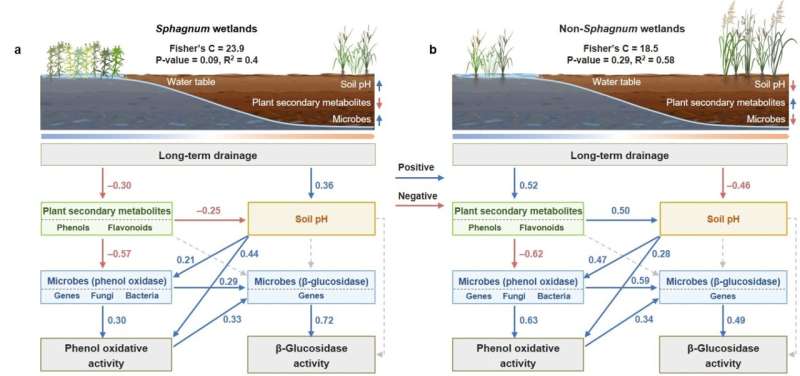This article has been reviewed according to Science X's editorial process and policies. Editors have highlighted the following attributes while ensuring the content's credibility:
fact-checked
peer-reviewed publication
trusted source
proofread
Plant-microbe interactions underpin contrasting enzymatic responses to wetland drainage

Researchers led by Professor Feng Xiaojuan from the Institute of Botany of the Chinese Academy of Sciences (IBCAS) have analyzed the divergent responses of carbon-degrading enzymes to wetland drainage and found that enzymatic response to long-term drainage diverges in Sphagnum versus non-Sphagnum wetlands due to varied vegetational shifts.
Their study was published in Nature Climate Change on August 15.
Tremendous carbon storage in wetlands is often attributed to inhibited enzyme (particularly phenol oxidase) activity under oxygen-deprived conditions. Drainage induced by climate change and human activities is expected to increase oxygen availability, potentially resulting in a surge of phenol oxidative activity and carbon decomposition.
"However, phenol oxidase response to field drainage is highly uncertain, constraining us from predicting wetland carbon-climate feedbacks," said Professor Feng Xiaojuan.
Therefore, Feng and her team conducted a nationwide, pairwise survey of drained wetlands across China that had experienced long-term (15–55 years) artificial drainage. The survey involved replicated pairs of waterlogged vs. drained soils in 30 wetlands, including 14 Sphagnum and 16 non-Sphagnum wetlands.
Based on literature data and laboratory simulations, they compared the response of phenol oxidative activity to drainage at different timescales in different wetland types. The results showed that while short-term drainage generally increases phenol oxidative activity, its response to long-term drainage diverges in Sphagnum versus non-Sphagnum wetlands.
Soil metagenomic and plant metabolic analyses demonstrated that long-term drainage is linked to increased plant secondary metabolites (especially antimicrobial phenols) and decreased phenol oxidase-producing microbes in soils of the non-Sphagnum wetlands.
In contrast, in Sphagnum wetlands, drainage is linked to the replacement of antimicrobial Sphagnum by vascular plants, which increases phenol oxidase-producing microbes and phenol oxidative activity with cascading effects on hydrolytic enzymes.
These results reconciled the contrasting changes of phenol oxidative activity following wetland drainage at different timescales and demonstrated that plant-microbe interactions, rather than oxygen availability, underpin the divergent responses of phenol oxidative activity to field drainage in Sphagnum vs. non-Sphagnum wetlands.
"This study highlighted the importance of trait-based plant dynamics to decipher wetland carbon dynamics and feedback to climate change under shifting hydrological regimes.
"Incorporating this novel mechanism into models will improve predictions of wetland soil organic carbon dynamics," said Professor Feng.
More information: Yunpeng Zhao et al, Plant–microbe interactions underpin contrasting enzymatic responses to wetland drainage, Nature Climate Change (2024). DOI: 10.1038/s41558-024-02101-3
Journal information: Nature Climate Change
Provided by Chinese Academy of Sciences


















